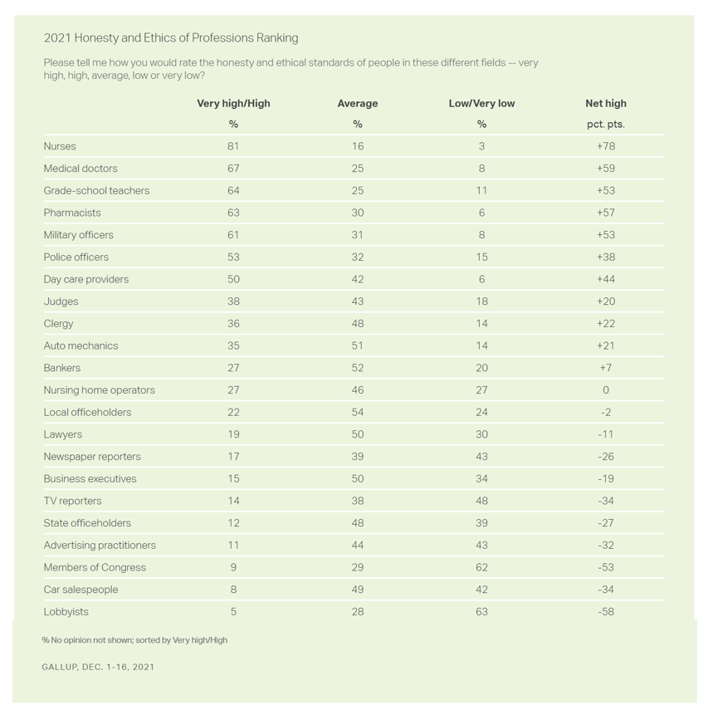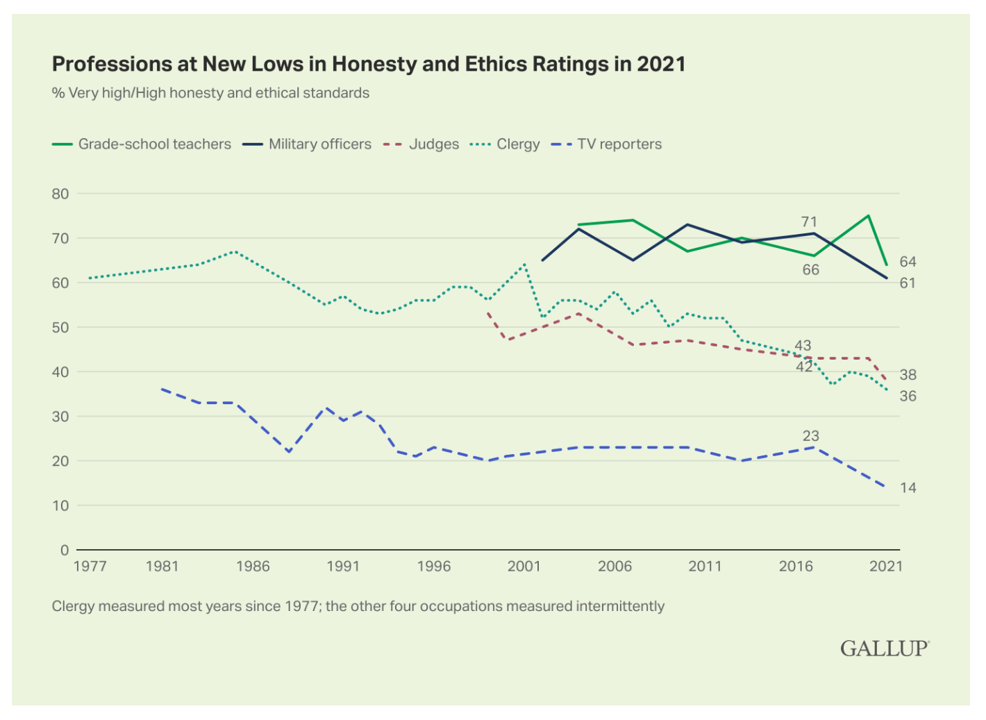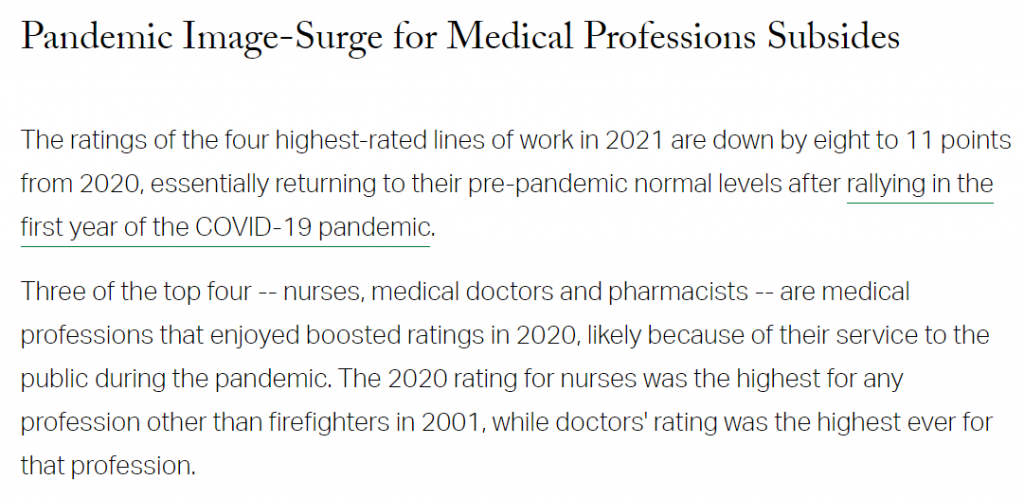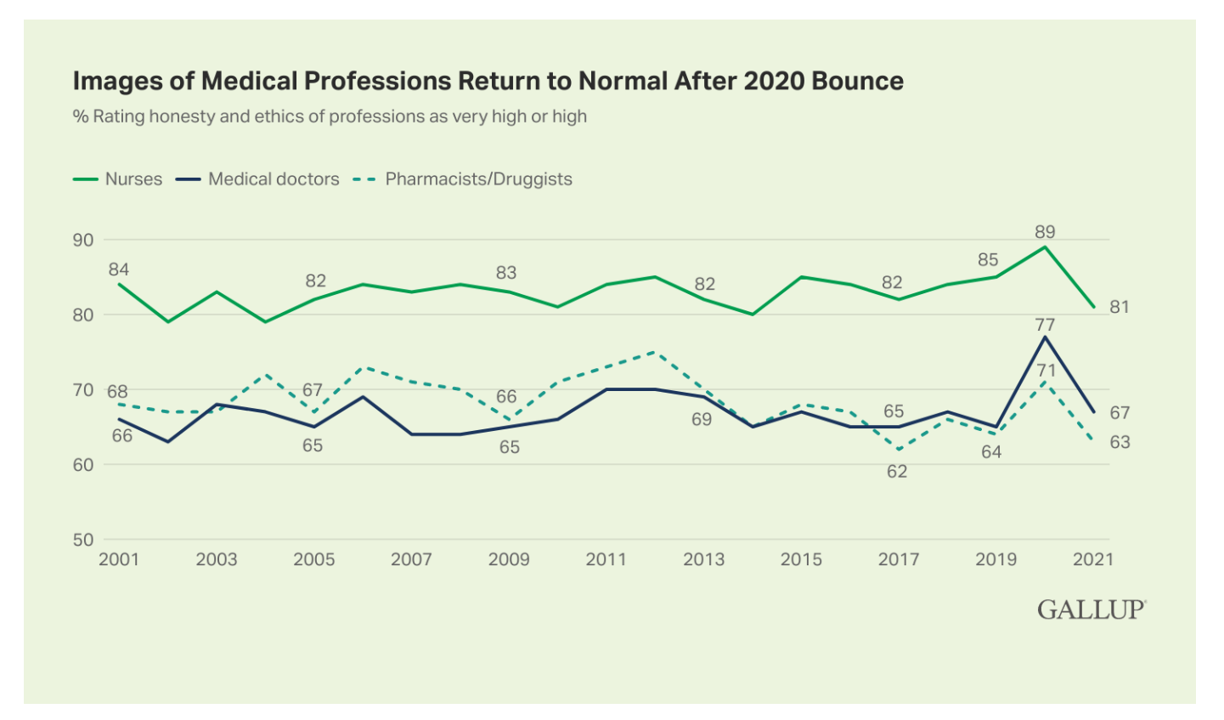Three health care professions rank in the top four of the most honest and ethical rankings in Gallup’s annual poll on honesty and ethics in professions.
 And nurses are at the top of the list for the 20th year in a row.
And nurses are at the top of the list for the 20th year in a row.
Grade-school teachers ranked third place between physicians and pharmacists, shown in the big chart of job types from most ethical to least.
Perennially, the bottom-ranked posts are a mix of politicians (Members of Congress and lobbyists, state office holders), car salespeople, and the Mad Men and Women of advertising.
Media professionals in TV and newspapers also polled relatively low versus other job categories.
There were a few visible shifts over the past two years of COVID-19 life that are worth calling out before diving further into the medical profession nuances…
First, while teachers are still lauded as a top ethical profession with health care workers, teachers’ ranking fell a bit in this round of polling to a relative low. Gallup surmises this may be a downturn in positive ratings among Republicans, with tensions rising between parents and teachers in the pandemic era return-to-school timing and public health mandates for masking, vaccinations, and other measures.
Respect for military officers also showed a significant drop among Republican voters. While there was an 8-point gap between Republicans and Democrats for honesty/ethics for military officers in this year’s survey, the ethics-perception drop among GOP voters over one year was much greater than for Dems.
 Now let’s get deeper into the health care profession numbers, because there is an important story to tell here. In the second chart, I pulled out data by job category filtered by consumer party affiliation. Note that nurses are highly rated for ethics and honesty by both Republican and Democrat voters, with a mere 1 point difference between the two party IDs.
Now let’s get deeper into the health care profession numbers, because there is an important story to tell here. In the second chart, I pulled out data by job category filtered by consumer party affiliation. Note that nurses are highly rated for ethics and honesty by both Republican and Democrat voters, with a mere 1 point difference between the two party IDs.
The numbers for pharmacists and doctors tell a different story: see that fewer Republicans rank pharmacists and physicians high on honesty/ethics than Democratic voters, by a difference of 13 points for pharmacists and 20 points for doctors.
 The third chart illustrates that U.S. consumers’ perspectives on honest and ethics and professions fell to pre-pandemic levels and lower for many professions. Here is the grade-school teacher decline for 2021 along with that for military offices, both top professions but declining in the year in reputation in the Gallup study.
The third chart illustrates that U.S. consumers’ perspectives on honest and ethics and professions fell to pre-pandemic levels and lower for many professions. Here is the grade-school teacher decline for 2021 along with that for military offices, both top professions but declining in the year in reputation in the Gallup study.
Judges, clergy, and TV reporters’ honesty-equity also declined further in the year.
 Health Populi’s Hot Points: The clear and current finding from this year’s Gallup poll on honesty and ethics in professions is that Nurses Rule above all for the worker we all agree we can trust, above all other job categories.
Health Populi’s Hot Points: The clear and current finding from this year’s Gallup poll on honesty and ethics in professions is that Nurses Rule above all for the worker we all agree we can trust, above all other job categories.
“Nurses ranking in this year’s poll directly reflects the trust the American public has in nurses and the work they continue to do to earn that trust, even amid a persistent pandemic,” the American Nurses Association (ANA) wrote its press release on the findings.
The ANA represents 4.3 million nursing professionals.
“The COVID-19 pandemic has placed a spotlight on nurses, reinforcing the critical contributions they make to our health care system, while also highlighting the devastating impact it has had on their mental health and well-being,” ANA noted.
The pandemic has wreaked havoc on nurses’ mental health and well-being, driving many to sign onto their individual “Great Resignations.”
There has been a nursing shortage long before COVID-19 hit the U.S. (and other countries’) health care systems. In 2022, the nurse shortage is indeed acute, requiring an immediate and sobering look and response to the situation for the short- and longer-terms, the ANA recognizes, and I concur.
The front-line of nurses in shrinking.
 Consider the following six calls-to-action, cited in a recent Nursing Journal article authored by three of my own trusted go-to nurse industry touchpoints:
Consider the following six calls-to-action, cited in a recent Nursing Journal article authored by three of my own trusted go-to nurse industry touchpoints:
- Listen to nurses’ concerns
- Prioritize workplace culture (e.g., call out and confront the real phenomenon of bullying nurses in health care settings)
- Adjust protocols to meet nurses’ needs (logistical, mental health, financial, et al)
- Increase diversity and representation in nursing
- Address the need for more nurse educators
- Support nurses leading health care innovation (like the fantastic Nurse Hack 4 Health program).
I would add one more action item that would help the current supply/demand challenge for nurses around the world…
Liberate nurses to operate at their highest and best use — especially important as we see more care moving to the home, the adoption of value-based payment, and greater digital and community-facing front doors to consumers’ accessing health care. Doing so would help the profession and help to reverse nurses’ discontent, improve autonomy and job satisfaction, and attract more prospects to the profession.





 I'm in amazing company here with other #digitalhealth innovators, thinkers and doers. Thank you to Cristian Cortez Fernandez and Zallud for this recognition; I'm grateful.
I'm in amazing company here with other #digitalhealth innovators, thinkers and doers. Thank you to Cristian Cortez Fernandez and Zallud for this recognition; I'm grateful. Jane was named as a member of the AHIP 2024 Advisory Board, joining some valued colleagues to prepare for the challenges and opportunities facing health plans, systems, and other industry stakeholders.
Jane was named as a member of the AHIP 2024 Advisory Board, joining some valued colleagues to prepare for the challenges and opportunities facing health plans, systems, and other industry stakeholders.  Join Jane at AHIP's annual meeting in Las Vegas: I'll be speaking, moderating a panel, and providing thought leadership on health consumers and bolstering equity, empowerment, and self-care.
Join Jane at AHIP's annual meeting in Las Vegas: I'll be speaking, moderating a panel, and providing thought leadership on health consumers and bolstering equity, empowerment, and self-care.